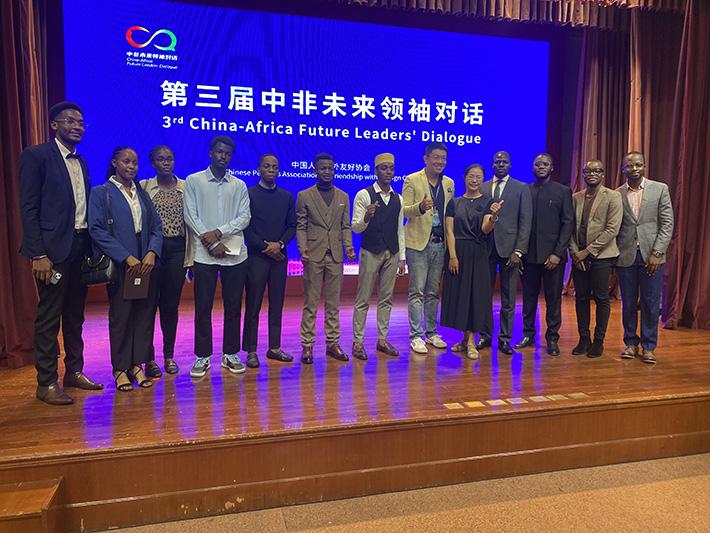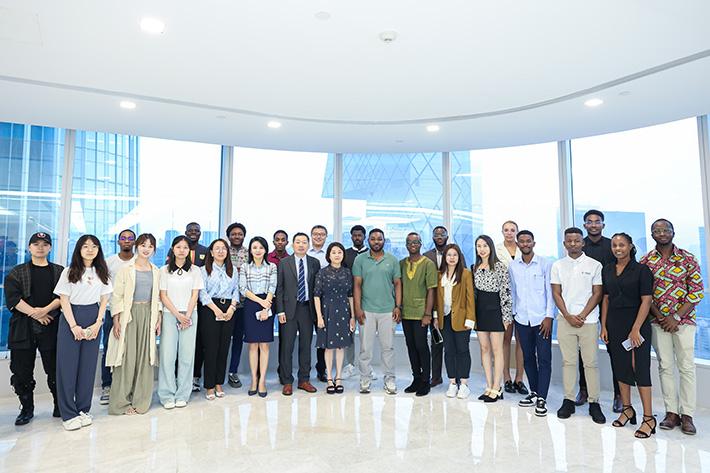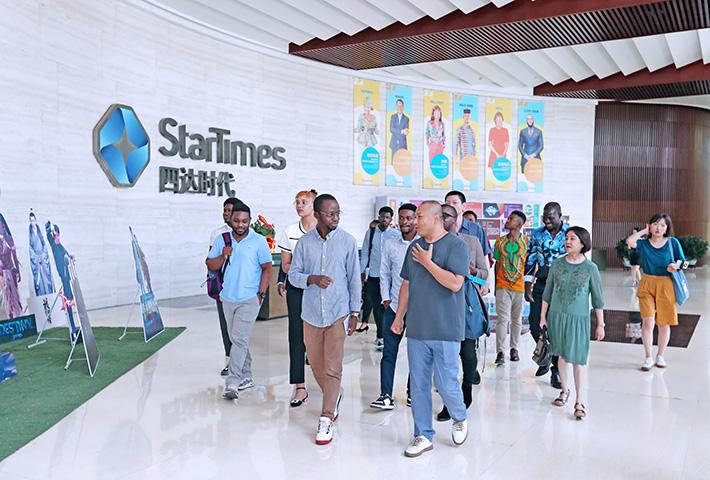
Patrice Monkam (right) poses for a group photo with other attendees at a seminar in Beijing on 14 July
The year 2023 marks the 10th anniversary of the Belt and Road Initiative (BRI), which was proposed by Chinese President Xi Jinping in two important speeches in 2013. The BRI is a robust socioeconomic development strategy that seeks to enhance cooperation, exchanges and connectivity between China and other parts of the world, including Asia, Europe, Africa and Americas.
This strategy is being implemented through a wide range of projects involving the building and/or renovation of land-based and maritime transport infrastructures (roads, railways, ports, airports, etc.), economic and industrial zones, etc. The main sources of financial resources needed for these projects include investments, loans and a wide range of partnerships between China and the participating countries.
It is important to note that the BRI constitutes a remarkable driving force for economic growth as it reinforces trade, investments and cultural exchanges, with the overall goal of achieving mutual benefits and win-win outcomes. This helps to foster stronger ties between different countries, thereby building a more interconnected and prosperous world. In this sense, BRI can also be seen as a suitable approach for strengthening China’s efforts towards fostering multilateral cooperation, mutual understanding and respect, and global stability.
Raising understanding
Although a significant portion of the world’s population may be familiar with the BRI concept, fewer people possess an in-depth understanding of its operational mechanisms and the socioeconomic effects. One of the key participants and beneficiaries of the BRI cooperation are youth. Therefore, to enable African youth especially those studying and living in China to acquire a thorough understanding of the role of the BRI in the socioeconomic development achieved by African countries during the past few years, the Chinese People’s Association for Friendship with Foreign Countries (CPAFFC) organised a field study project centred around the BRI.
Themed Getting Closer to Belt and Road - Field Study by African Students Studying in China, it aimed at providing African youth with a thorough comprehension of the various projects implemented under the BRI framework as well as their effects on Africa’s development and people-to-people exchanges between China and African countries. This field study project lasted for three days and concluded with the hosting of the third edition of the China-Africa Future Leaders’ Dialogue (CAFLD) held under the theme China-Africa Youth: Working Together for High-Quality Belt and Road Cooperation Between China and Africa.
The CAFLD is an event initiated by the CPAFCC under the framework of the Forum on China-Africa Cooperation (FOCAC). The dialogue is aimed at building a new platform for in-depth conversations and coordinated actions amongst the Chinese and African youth, so as to work together to create a better future for all. Participation in the field study and the dialogue provided us with an in-depth understanding of the BRI’s significance and its pivotal role in driving the socioeconomic achievements witnessed by African countries in the recent years, thereby leading me and other African youth to a deep dive into the BRI and its role in building a China-Africa community with a shared future.

Patrice Monkam (right) poses for a group photo with other attendees during a visit to Yingke Law Firm in Beijing on 12 July Reinforcing friendship
Reinforcing friendship
During the field study project, we visited five different Chinese enterprises operating in different sectors including media and communication, infrastructure development, policy and law development, entrepreneurship and innovation, information technology, etc. The visited enterprises include StarTimes, China Road and Bridge Corp., Yingke Law Firm, Zhongguancun Belt and Road Industrial Promotion Association (ZBRA), Xiaomi Tech Corp. and Kunlun Tech Corp.
StarTimes is one of the most influential network operators and content providers in China’s TV broadcasting industry, and has been working closely with African governments to jointly promote digitalisation and informatisation. With established branches in over 30 African countries, StarTimes provides digital TV and online streaming operation, and is among the first companies to bring digital TV to African villages and suburban areas. Through access to digital TV, people could get a broader view of the world.
In addition, some entertainment and educational programmes broadcasted on the TV channels provide African people with knowledge about China’s development and Chinese culture, which plays a crucial role in strengthening China-Africa friendship and mutual understanding.
During our visit to China Road and Bridge Corp., we were able to get acquainted with the various infrastructure development projects realised by Chinese enterprises in African countries under the BRI framework. A few of the most remarkable of these projects include the Nairobi-Mombasa Standard Gauge Railway, which has enabled faster transportation of goods and created business opportunities and jobs, and more than 1,300 km of highways.
At the Xiaomi Tech Corp.’s display room, we could see the great advancements made by Chinese enterprises in the areas of information technology and telecommunication in the recent years. Some of the products that may be of great help in improving living conditions in African countries include integrated all-in-one LED TV, affordable and high-quality smartphones, electric sockets, smart home control systems, etc.
Yingke Law Firm and Kunlun Tech Corp. are two of the private companies which are part of the China-Africa Business Council (CABC), an organisation that actively responds to the measures of FOCAC. It was officially established in 2006 after being initially proposed by then Secretary General of the United Nations Kofi Annan in 2004. Yingke Law Firm focuses on providing Chinese enterprises interested in entering the African markets with market analysis reports, introduction of local policies and regulations in African countries, etc., thereby facilitating investments and trade between China and African countries.
Kunlun Tech Corp. is one of the leading Internet platform enterprises which operates overseas information distribution and metaverse platform Opera, overseas social entertainment platform StarX, and global mobile game platform Ark Games, among others. With the establishment of Opay in Africa, Kunlun Tech Corp. has made online payments and digital services much easier in many African countries, contributing to the digital transformation of the continent and creating jobs for young people.
Our visit to the Zhongguancun Belt and Road Industrial Promotion Association (ZBRA) helped me to discover some of the career development platforms available in Beijing for foreign students and talents.

Patrice Monkam (left second) visits StarTimes headquarters in Beijing on 11 July
Youth voices
This year’s CAFLD marked the first edition held in-person due to the challenges brought by the COVID-19 pandemic during the past three years. After the opening remarks by Jiang Jiang, vice president of the CPAFFC, and Didier Dacko, ambassador of Mali to China, African and Chinese youth shared their thoughts on different topics. Both speakers emphasised the importance of leveraging the BRI to further reinforce China-Africa ties and China-Africa youth exchanges.
After participating in these two events and hearing from both Chinese youth and fellow African youth, I do believe that with collective efforts, solidarity and perseverance, nothing is impossible.
In addition, I urge African youth to keep learning and exploring China’s development strategies so as to be able to design reliable approaches that can speed up the socioeconomic development of their home countries.